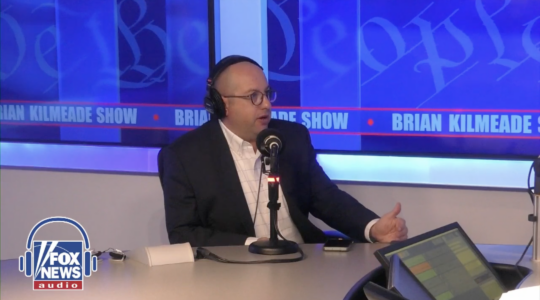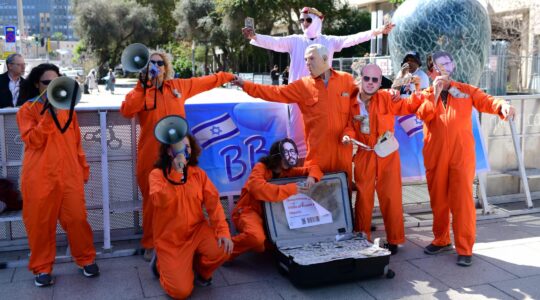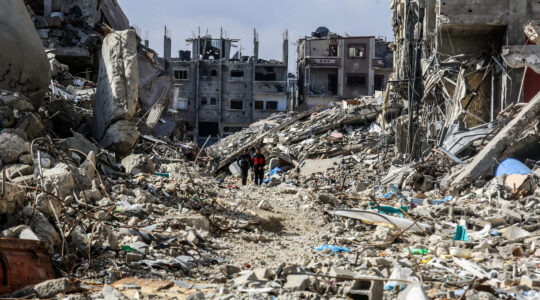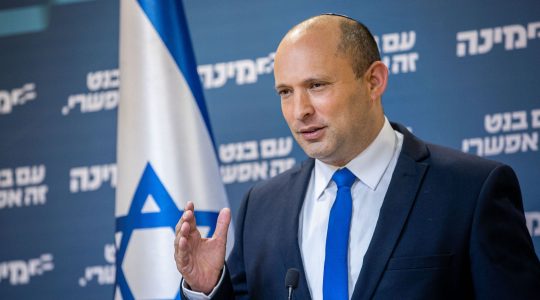
Israeli Arabs wave Palestinian flags as they protest a march by right-wing Israelis in the Israeli-Arab city Umm al-Fahm on March 24, 2009. (Brian Hendler)

Israeli rot police take cover from stone throwers during a march by right-wing Israelis in the Israeli-Arab city in Umm al-Fahm on March 24, 2009. (Brian Hendler)

Israeli riot police use a water cannon to disperse stone throwers protesting a march by right-wing Israelis in the Israeli-Arab city Umm al-Fahm on March 24, 2009. (Brian Hendler)
UMM EL-FAHM, Israel (JTA) — In a battle played out in courtyards, olive groves and the puddle-filled pavement, hundreds of youth clashed with Israeli riot police to protest a march in their Israeli-Arab town by a band of far-right activists.
“There is room for all of us to live in this country, but these people come here as our enemies,” said Ahmed Agrabria, manager of the town’s local soccer team, Beitar Umm el-Fahm, referring to the 50 marchers who had come Tuesday.
“Many Jews come to Umm el-Fahm, they eat in our restaurants, we work together. We visit them and they visit us,” he said. “But those who come this way, with force, that is unacceptable.”
Critics of the march, which was led by Baruch Marzel, a well-known far-right provocateur, said the event was a ruse to inflame tensions. But the day’s events also reflected a new mood of heightened suspicion and strain between Israel’s Jewish and Arab citizens.
Tensions are boiling in the aftermath of the recent Israeli operation in the Gaza Strip, with Arabs upset over the civilian death toll and the subsequent electoral success of Avigdor Lieberman. His Yisrael Beiteinu party is now the third largest in Israel after surging in popularity in the Feb. 10 elections on a platform that questioned the loyalty of Arab Israelis.
“Look at the government, it’s one of extremists and we are afraid of that,” said Yunis Jabareen, a former deputy mayor of Umm el-Fahm.
Lieberman has used Umm el-Fahm as an example of an Arab town he would like to see transferred to Palestinian rule in the event of a possible future peace deal. As Jabareen spoke on a street littered with stones, grenades went off nearby as police tried to disperse the demonstrators.
Some 2,500 police in riot gear, some mounted on horses, had been sent to secure the city and try to keep the sides from each other. They mostly succeeded, keeping the vast amount of protesters away by cordoning them off with police-manned barricades about 400 yards away from where the marchers walked, waving Israeli flags as some sang “The Nation of Israel Lives.”
The march lasted only about 15 minutes, but the clashes that ensued went on for about three hours. Arab youths, some wearing keffiyehs around their necks or wrapped to cover their faces, faced off with the police who responded by firing rounds of tear gas, setting off stun grenades and unleashing water cannons.
Several dozen people were injured either from tear gas or stones, among them a top police commander and a lawmaker from the left-wing Meretz Party, one of a group of Jewish Israeli peace activists who came to protest the march.
The march was a showdown months in the offing. It was scheduled to be held last year but canceled by the police citing fears of the rioting it could spark. Marzel and his supporters petitioned the Supreme Court, which ruled they had the democratic right to assemble in Umm el-Fahm.
“We came to say that the State of Israel is a Jewish state,” said Itamar Ben-Gvir, another well-known far-right activist who helped lead the march. “We came in a show of loyalty and to say whoever is loyal, welcome. But people who flout the law should get out of here.”
Umm el-Fahm, a town of 50,000, is home to one of the first Arab municipalities to vote the radical Islamist movement into office. Among the Arab towns and cities in Israel, it is viewed by Jewish Israelis as something of a symbol of hostility for its outspoken allegiance to Arab nationalism, including solidarity with its Palestinian counterparts in the West Bank and Gaza.
During the recent Gaza operation, for example, thousands of the town’s residents took to the city’s streets to demonstrate against Israel’s actions.
Umm el-Fahm residents seem confounded by their bad reputation among their fellow Israeli citizens and say they seek no conflict with the state. Like other Arab Israelis, they claim their lives are made more difficult by discrimination against them when it comes to employment and national priorities.
“The problem is that Israel is going in a rightward direction,” said Khaled Mahmeed, a member of the Islamist movement who sits on the city council. “This makes us as Arab Israelis fear for the future.”
Ilan Sadeh, the head of the Menashe regional council, a neighboring municipality, was among a number of Israeli Jews from the area who had come to show his solidarity with the people of Umm el-Fahm.
“The goal of the marchers is to say coexistence cannot work and I’m here to say it can,” said Sadeh, listing a number of joint tourism and business projects in the Wadi Ara-area involving Jewish and Arab towns and villages.
JTA has documented Jewish history in real-time for over a century. Keep our journalism strong by joining us in supporting independent, award-winning reporting.





